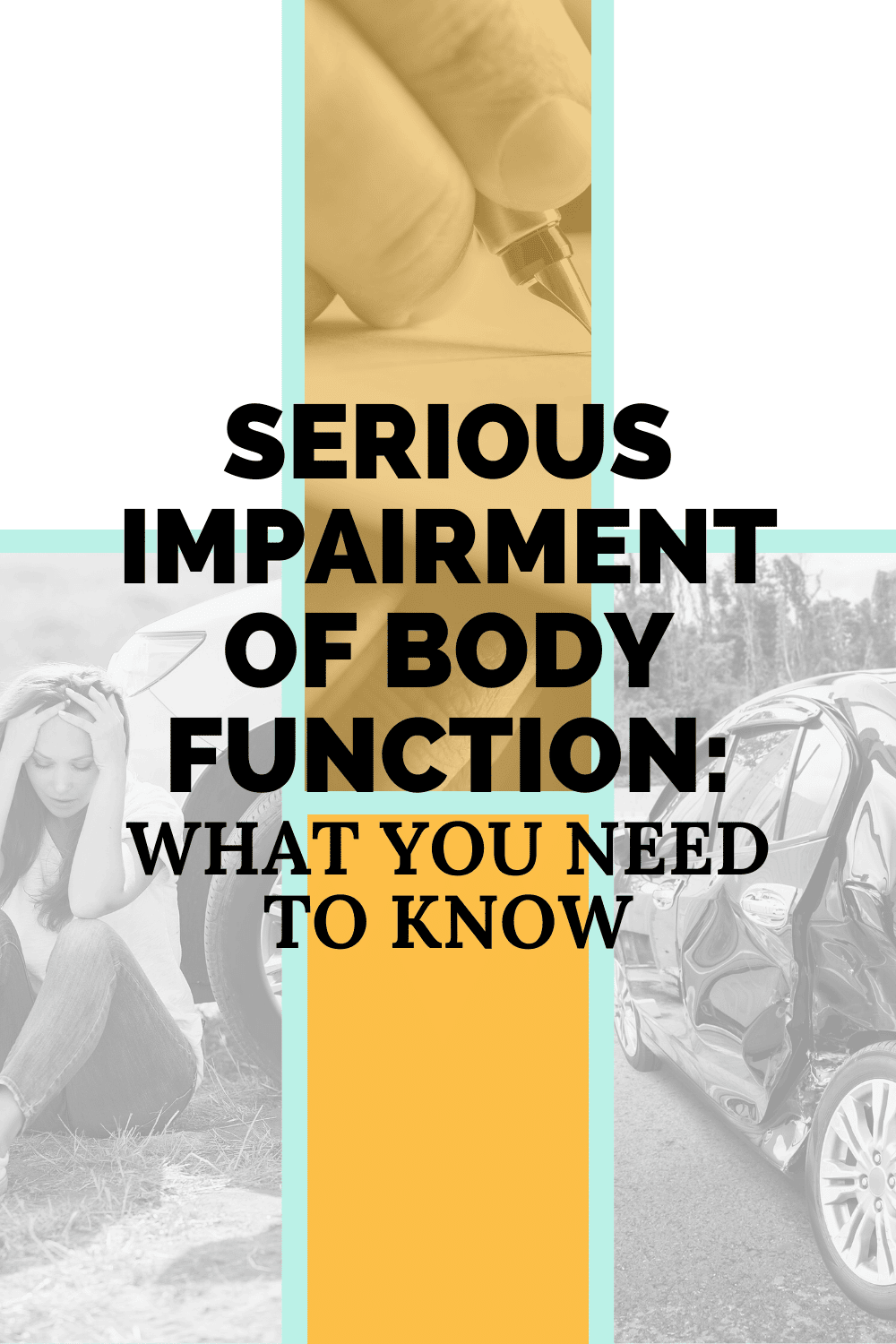
If you have been injured in a car accident, your lawyer will need to show that you have suffered a serious impairment of body function in order for you to recover pain and suffering compensation from the at-fault driver under Michigan’s auto law.
In order to prevail in an auto negligence lawsuit on your claim against the at-fault driver for pain and suffering compensation, you will also need to prove: (1) the at-fault driver was negligent; (2) you suffered injuries; and (3) the at-fault driver’s negligence caused your injuries. (M Civ JI 36.15)
What is a serious impairment of body function?
Serious impairment of body function is a legal test involving an injury threshold that a car accident victim must meet in order to recover pain and suffering compensation – which is also referred to as “noneconomic loss” damages – from the at-fault driver who caused the crash under Michigan law. (MCL 500.3135(1), (3)(b))
What is the law on serious impairment of body function?
Michigan law requires that an auto accident crash victim can recover pain and suffering compensation – or “noneconomic loss” damages – from the at-fault driver that caused the crash only if the victim suffered an “objectively manifested . . . impairment of an important body function . . . [that] affects the injured person’s general ability to lead his or her normal life . . .” (MCL 500.3135(1) and (5))
When Michigan’s No-Fault law was initially enacted in 1973, the law simply required that an auto crash victim prove that he or she suffered a “serious impairment of body function” to recover pain and suffering compensation.
Then came two Michigan Supreme Court cases – Cassidy v. McGovern in 1982 and DiFranco v. Pickard in 1986 – that attempted to define what that meant.
The Michigan Legislature then amended the No-Fault threshold law in 1996 and created its own legislative definition as “an objectively manifested impairment of an important body function that affects the person’s general ability to lead his or her normal life.”
In 2004 in Kreiner v. Fischer, a highly partisan Michigan Supreme Court created its own requirements. This resulted in thousands of innocent and seriously injured automobile crash injury victims being wrongfully denied access to justice.
In its 2010 ruling in McCormick v. Carrier, the Michigan Supreme Court overruled Kreiner’s misinterpretation of the “serious impairment of body function” threshold law, emphatically rejecting both the reasoning and ruling of the Kreiner court:
“We hold that Kreiner v. Fischer . . . was wrongly decided because it departed from the plain language of MCL 500.3135, and is therefore overruled . . . Because the Kreiner majority created ambiguity where there was none, and crafted a statutory interpretation that is, in effect, a judicially constructed house of cards, we hold that it incorrectly interpreted [the law]. The Kreiner majority aggravated this error, and departed even more dramatically from the statutory text, by providing an extra-textual ‘nonexhaustive list of objective factors’ to be used to compare the plaintiff’s pre- and post-incident lifestyle . . . Because the factors adopted by the Kreiner majority are not based in the statutory text, and this Court’s role is to apply the unambiguous statutory language, not improve it, we hold that the majority erred by adopting them.”
In 2019, the Michigan Legislature in Public Acts 21 and 22 of 2019 amended threshold law in MCL 500.3135(1) and (5) “to codify and give full effect to the opinion of the Michigan supreme court in McCormick v Carrier, 487 Mich 180 (2010).”
When is a serious impairment of body function objectively manifested?
Michigan’s No-Fault auto law explains that a “serious impairment of body function” is “objectively manifested” when the impairment “is observable or perceivable from actual symptoms or conditions by someone other than the injured person.” (MCL 500.3135(5)(a))
What body function must be seriously impaired?
By definition, Michigan law requires that the crash victim suffer an objectively manifested impairment “of an important body function, which is a body function of great value, significance, or consequence to the injured person.” (MCL 500.3135(5)(b))
When does an objectively manifested impairment of a body function affect a person’s ability to live his or her normal life?
An objectively manifested impairment of an important body function “affects” a car crash victim’s “general ability to lead his or her normal life” when “it has had an influence on some of the person’s capacity to live in his or her normal manner of living.” (MCL 500.3135(5)(c))
The law also specifically states that “there is no temporal requirement for how long an impairment must last.” (MCL 500.3135(5)(c))
The law also clarifies that the examination of how an impairment affects a victim’s general ability to lead his or her normal life “is inherently fact and circumstance specific to each injured person, must be conducted on a case-by-case basis, and requires comparison of the injured person’s life before and after the incident.” (MCL 500.3135(5)(c))
Have you suffered a serious impairment of body function? Call and speak to a Michigan Auto Law attorney for a free consultation
If you suffered a serious impairment of body function in an automobile crash and you have questions about your legal rights to pain and suffering compensation from the at-fault driver who caused your car crash, you can call toll free anytime 24/7 at (800) 968-1001 for a free consultation with one of our experienced car crash attorneys. You can also get help from an experienced auto accident attorney by visiting our contact page or you can use the chat feature on our website.



